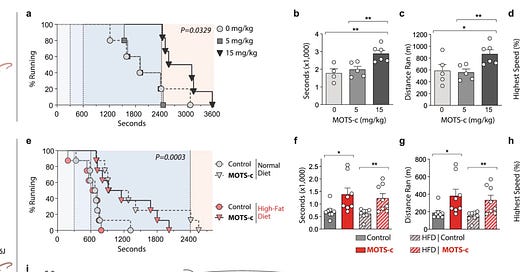MOTS-c: mitochondrial peptide that mimics exercise
A study in the journal Nature explains the research on a fascinating peptide known as MOTS-c.
A little background: peptides, amino acids, and proteins
Small peptide molecules are made up of 2-50 amino acids. Amino acids also make up proteins, but are found in chains longer than 50.
Mitochondria are the organelles responsible for energy production in your cells, making mitochondrial health critical to all aspects of health and wellness - especially as you age.
Your mitochondria contain their own DNA, which is separate from your nuclear DNA. But mitochondrial DNA is tiny compared to your entire genome-only about 13 protein-coding genes compared to more than 20,000 in the cell nucleus.
Peptides from mitochondria:
In addition to the protein-coding genes in the mitochondrial DNA, researchers have recently identified short open reading frames (sORFs) that produce bioactive peptides.
One of the mitochondrial peptides is MOTS-c, and researchers are now figuring out that it does a lot...from regulating nuclear gene expression to promoting healthy metabolism. MOTS-c activates AMPK (5' AMP-activated protein kinase) in skeletal muscle and improves whole-body energy metabolism.
MOTS-c study: exercise in a bottle?
The Nature study used cell samples from healthy young men to determine the normal effects of exercise on MOTS-c production in muscle cells. The results showed that MOTS-c levels increased significantly in the four hours after exercise.
Next, the researchers used animals to determine the effect of giving the animals additional MOTS-c.
In young animals, giving MOTS-c at a high enough dose effectively reduced weight gain on a fattening diet.
In middle-aged and old animals, a two-week treatment with MOTS-c increased physical activity capability by two-fold.
In old animals, MOTS-c treatment also improved healthspan..
Other research on MOT-c points to its role in metabolic health. Studies show that it can regulate GLUT4 and STAT3, and it may reduce insulin resistance.[ref] MOTS-c also has immunoregulatory effects. In a mouse model of type 1 diabetes, MOTS-c improved glucose tolerance and insulin secretion.[ref]
Interestingly, several studies mention that MOTS-c targets the methionine-folate cycle. Methionine restriction has long been known to increase lifespan.[ref]
Conclusion:
MOTS-c holds great promise for halting the diseases of aging and extending lifespan. In its current form, it is only available as an injection - and much more human clinical trial data is needed to understand optimal dosage and timing. But it is something to keep on your radar. Exercise in a bottle may make some people think, "Why not just exercise?" but for older people or people with disabilities, this could be a great option.




